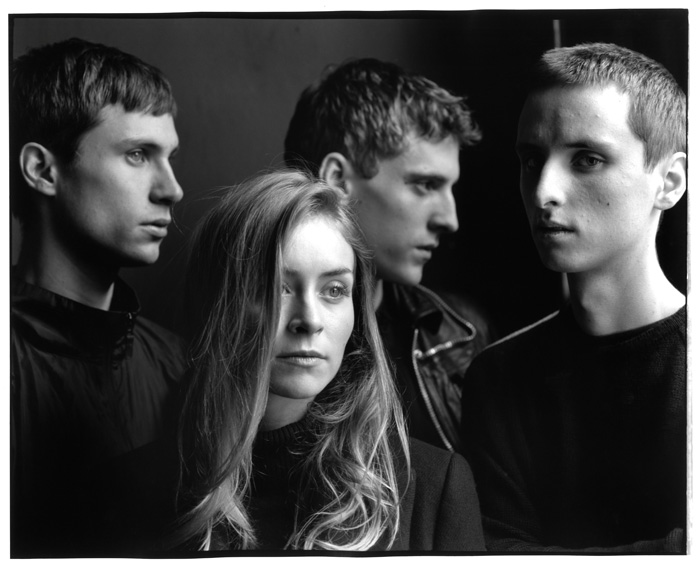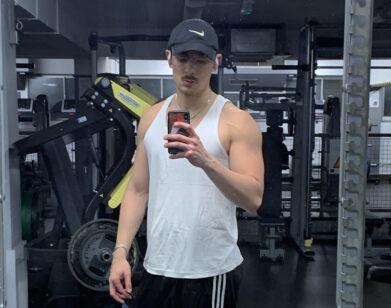Swords Drawn: These New Puritans

These New Puritans have always been a curiosity. With 2007’s Beat Pyramid, the nervy cadence of their music kept them on the periphery of the post-punk umbrella that loomed large over England that year. But really, frontman Jack Barnett explains, “That was basically a hip-hop album.”
He adds: “People who dismissed us didn’t really listen–and now they are surprised at we’re doing.” Difficult-to-categorize genres aside, it was the head-scratching concepts in their music that truly established them as brilliant, remote outsiders. While other bands sang of heartbreak and pub brawls, These New Puritans were delicately channeling the occult, with oblique references to numerology, colors, alchemy, the apocalypse, and ‘magick’ peppering their lyrics.
On their new album, Hidden, These New Puritans retain some of the “nouveau Paganist'”rhetoric, but focus on evolving their sound, which is bigger, braver, and even more byzantine than ever. It’s an artistic feat that has led many critics to call Hidden the “first masterpiece of the decade.” The album features everything from children’s choirs to Taiko drums to samurai swords. The first single, “We Want War,” sounds like a sonic relic from an ancient, alien world on the cusp of demise. As its title suggests, Hidden is full of secrets–it bears the mark of the anonymous auteur. Luckily for Interview, frontman Jack Barnett sheds a little light on the mystery of his band as “Attack Music,” the band’s new single and self-described “big shiny dance video” (above) is making its way through the blogosphere:
COLLEEN NIKA: There are a lot of unusual elements on the new album–swords being sharpened, sounds that simulate the crushing skulls. Did those things shape your spooky lyrics, or were they added to compliment the words?
JACK BARNETT: Everything in the music was planned for. In fact, the lyrics were the last step! It was quite an unconventional process. I love the idea of a live sword fight replacing parts of songs where a traditional pop vocal would come in. It sounds very high tech.
NIKA: Hidden is a big step forward for you artistically. Did this evolution happen spontaneously or did you plan to make this directional shift?
BARNETT: It’s not a giant step forward; it’s a step sideways. And I always knew we’d make this album; I knew even while we were recording Beat Pyramid. I always know in advance what we’re going to do: I can even tell you now what our next album will be like.
NIKA: Do you think the idea of the occult becoming trendy in music?
BARNETT: I haven’t thought of it before, but it may be, actually. Of course, it’s something we dealt with more on our first album and we’re looking at things differently no–I can‘t even relate to that album now. But there’s glimpses of it here and there with people like Fever Ray.
NIKA: What’s next for the band?
BARNETT: We’re touring the US this summer. We’ve got a plan for a “special release”–a cross between a film and music project. I’m also writing a lot of music for a project about all the Island of Essex; we may be getting some sort of government or corporate funding for that–who knows what will happen there. I’m listening to a lot of dancehall, medieval English mason’s music, and even post-Neptunes American pop. Oh, and David Fanshawe’s field recordings. We’ve been writing a lot of melancholy music on steel drums–that may be a hint of where we are heading next.
NIKA: You’ve been quoted as saying “The apocalypse is good for art.” What does that mean?
BARNETT: It was tongue in cheek, but it really just means: sometimes it’s more productive for things to not be too nice, you know?






